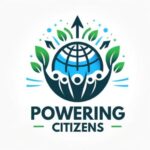Powering Citizens at the Democracy Action Days
At the beginning of October, the whole Comparative Research Network (CRN) team and their project partners gathered at the Europäisches Haus in Berlin, for a two-day event, the Democracy Action Days, aimed at promoting democracy and citizen participation.
The POWERINGCITIZENS project was featured in the first morning session to discuss energy democracy, community involvement, and solutions to energy poverty.
Addressing Energy Poverty Through Collective Action
The POWERINGCITIZENS project tackles the pressing issue of energy poverty, which affects millions across Europe. Rising energy costs have made heating unaffordable for many, leaving households, particularly vulnerable groups like single-parent families, in precarious situations. One of the core challenges identified during the event was that many energy-poor citizens in partner countries lack the ability and resources to participate in energy, housing, and climate policy discussions. This gap in participation shows the need for inclusive approaches that empower communities.
Panel on Energy Democracy Across Europe
Gosia Binczyk, Deputy Head of the Representation in Berlin of the Europäisches Haus, opened the session, emphasizing the significance of initiatives that promote accessibility and active participation for citizens. Her inspiring speech was followed by a panel on energy democracy in Europe, where experts from different countries discussed the state of citizen participation in energy generation and decision-making.
- Jerome R. Haßler, Climate Adaptation Manager of Luckau (Germany), presented insights on the city’s participatory strategies for climate adaptation. He highlighted planning challenges related to the topic, such as land-use priorities and district heating networks, that require innovative solutions and the general public’s acceptance.
- Anna Krenz, from the Nordic Folkecenter for Renewable Energy (Denmark) introduced the Danish model of a decentralized approach to wind energy with citizen-led energy initiatives, showing how local engagement can build strong foundations for sustainable energy practices.
- Meivis Sturga from ETMI (Albania) focused on the specific barriers and potential solutions in the Balkans region, where coal dependency remains a significant challenge. He underlined the importance of aligning legal frameworks with participatory approaches to promote energy democracy.
Roundtable: The Feasibility of Energy Democracy Projects
The event concluded with a roundtable discussion that raised an essential question: Can projects like POWERINGCITIZENS make a tangible difference in addressing energy poverty and promoting democratic participation in energy transitions? During the session, partners from INZEB, ETMI, BGF, ECREC and UNIVPM introduced their organizations, highlighted the actions they take in the energy and energy poverty field, and provided insights into the general situation in their respective countries. The conversation revolved around lessons learnt from current projects, the importance of both bottom-up and top-down strategies, and the need to build trust among communities for long-term success.
Key Takeaways
Overall, the event highlighted that solutions must go beyond short-term financial aid, focusing instead on education, public involvement, and supportive policies. By integrating youth engagement and citizen participation, POWERINGCITIZENS and other projects can ensure broader acceptance and sustainable impact.
Stay tuned to our upcoming publications, where we’ll share more insights from the event and explore the current energy situation across Europe.



